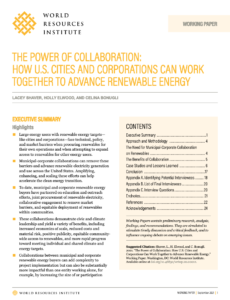Full Title: The Power of Collaboration: How U.S. Cities and Corporations Can Work Together to Advance Renewable Energy
Author(s): Lacey Shaver, Holly Elwood, Celina Bonugli
Publisher(s): World Resources Institute (WRI)
Publication Date: September 1, 2021
Full Text: Download Resource
Description (excerpt):
Large energy users with renewable energy targets—like cities and corporations—face technical, policy, and market barriers when procuring renewables for their own operations and when attempting to expand access to renewables for other energy users. Municipal-corporate collaborations can remove these barriers and advance renewable electricity generation and use across the United States. Amplifying, enhancing, and scaling these efforts can help accelerate the clean energy transition.
To date, municipal and corporate renewable energy buyers have partnered on education and outreach efforts, joint procurement of renewable electricity, collaborative engagement to remove market barriers, and equitable deployment of renewables within communities. These collaborations demonstrate civic and climate leadership and yield a variety of benefits, including increased economies of scale, reduced costs and material risk, positive publicity, equitable community wide access to renewables, and more rapid progress toward meeting individual and shared climate and energy targets.
This report focuses on cities and corporations as two of the largest energy users that set climate and energy goals or targets and purchase renewable electricity for their operations. Collaboration can include other partners and be utilized to achieve other goals, like equity and local economic development; however, this report is scoped on the opportunity to advance renewable energy as a common municipal and corporate goal. Many of the lessons learned could be applied to collaborations with other large energy buyers, such as universities and public agencies like school districts. Because this report is based upon interviews on a rapidly evolving topic, there may be other examples or types of collaborations not covered below. Finally, collaboration on any of these topics is not mutually exclusive.
